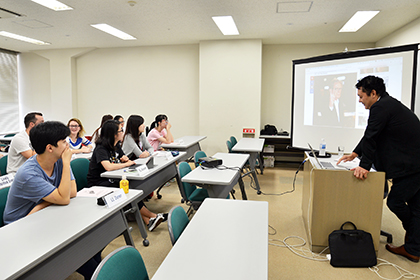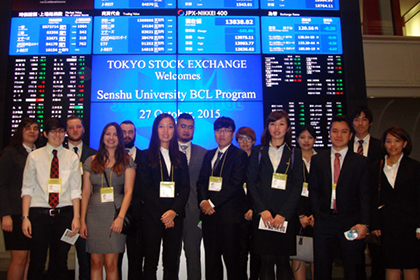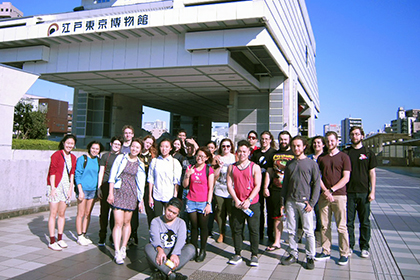About the BCL Program
The BCL Program(Survey of Japanese Business, Survey of Japanese Culture & History and Japanese Language Courses)
WHAT IS THE BCL PROGRAM?
The BCL (Japanese Business, Culture & History and Japanese Language) Program has been specifically designed for students from Senshu’s partner universities and offers them a general understanding of not only the Japanese language, but also Japanese business practices, cultural paradigms, and a chance to experience daily life in Japan. The program starts in the middle of September and ends in the middle of December (12 weeks in total). It consists of three courses:
The “Japanese Language” course is offered to all international students, including individual participants, who wish to learn the language intensively. It features class levels ranging from beginner to advanced.
- Survey of Japanese Business*
- Survey of Japanese Culture & History*
- Japanese Language
The “Japanese Language” course is offered to all international students, including individual participants, who wish to learn the language intensively. It features class levels ranging from beginner to advanced.

SURVEY OF JAPANESE BUSINESS
This course will be conducted similarly to last year but with various improvements (including new lectures and company visits). Previous year' total class hours were at 60 hours, which includes lectures, company visits, and a research project. Throughout this course, students gain invaluable insight into the business concepts and management philosophies that made Japan one of the world’s largest economies. The first objective of this course is to provide students with a theoretical framework of Japanese-style business practices through informative lectures. The second is to give students a firsthand look into the inner workings of Japanese corporations through company visits. The third is to improve students’ analytical skills by having them conduct research and present their findings. Accordingly, the three core course components have been divided into the following:

Lectures
Teachers and professionals from various backgrounds share their expertise with students through lectures, case studies, and class discussions.[Last Year's Lectures]
- Marketing Evolutions and Corporate Strategies of Japanese Companies
- Gender and Organizational Customs in Japanese Companies
- Japan’s Success, Failure, and Lessons Viewed from Financial Aspects
Company Visits
Students visit companies, factories, and other organizations located within Tokyo /Kanagawa.[Last Year's Company Visits]
- Coca-Cola Bottlers Japan
- System I (IT Company)
- Startup Hub Tokyo TAMA (Entrepreneurship Support Facilities)
Field Research Project (Topic: “Museum Safari”)
The purpose of this field research project (using qualitative research methods) is to visit museums in and around Tokyo with Senshu University students and give a presentation about their findings (including visual aides and a Q&A session). The Senshu Univesrity students who accompany BCL Program participants provide assistance and answere questions. In order to given thourough presentations, BCL Program partitcpants are instructed to take “fieldnotes” (notes about what they observed, learned, and experiend at the musuems).SURVEY OF JAPANESE CULTURE & HISTORY
This course will be conducted similarly to last year but with various improvements (including new lectures and company visits). Previous year' total class hours were at 67 hours, which includes lectures, company visits, and a research project. The purpose of this course is to deepen students’ understanding of Japanese culture and history through various lectures, field trips/excursions, and hands-on activities that are culturally unique to Japan.

Lectures
Throughout this course, students are exposed to a wide range of viewpoints regarding Japanese culture and history, especially through the lectures conducted by teachers and professionals (all with diverse backgrounds and areas of expertise). These Lecturers aim to provide students with a well-rounded understanding of Japanese society by discussing topics that cover both ancient and modern Japan, such as the Japanese history, pop-culture, intercultural communication, and other aspects of modern Japanese culture and subcultures (such as anime and manga).[Last Year's Lectures]
- Gender Equality in Japan
- Labour and Bildungsroman in Ghibli Works
- Intercultural Communication: Polite Fictions
Field Trips & Excursions, and Activities
In this course, students gain access to places of cultural interest through field trips and excursions. Since the goal of this course is not simply to teach students about Japanese culture and history, but let them experience it firsthand, students are provided with many opportunity to immerse themselves in traditional Japanese activities.[Last Year's Field Trips, Excursions, and Activities]
- Senshu University Kanda Campus Tour
- Ikebukuro Life Safety Learning Center
- Asakusa Visit Tour
- Sho-do (Japanese Calligraphy)
- Sado (Tea Ceremony)
JAPANESE LANGUAGE COURSE
The purpose of this course is to equip students not only with fundamental Japanese grammar and vocabulary, but also a comprehensive understanding of how to communicate effectively in Japanese. Classes are arranged according to students’ levels (usually four to six different levels) with a maximum of 12 students per class. Students are placed in an appropriate level class according to the results of their preliminary comprehension checklist. Upon arriving in Japan, students will also be given a final oral and written test to determine the most appropriate class level for them.Classes: 9:00 am – 12:50 pm Monday to Friday
(four periods comprised of four successive 50 minute sessions)
Activities and field trips may be held in the afternoon and on Saturdays.
Students will have a homeroom teacher, but also be regularly taught by different instructors throughout the week. At the end of the course, students will give short presentations in Japanese on any topic they choose.
Home Visit
Students have the option of participating in a “Home Visit” (i.e. weekend homestay lasting for 3 days and 2 nights) during the BCL Program. This is a wonderful opportunity for students to intimately experience the dynamics of Japanese family life and apply their Japanese language ability in a meaningful way.
Leaflet for the 2024 BCL Program [as of April 2024].pdf